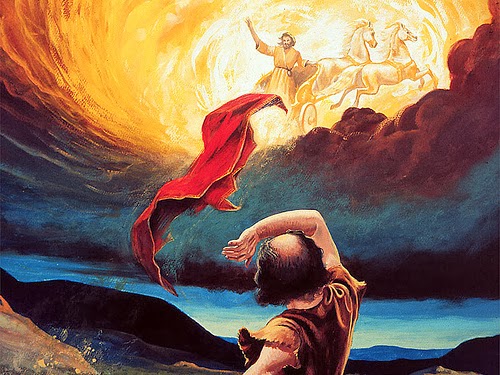Did Elijah Go to Heaven?
Asher Chee |
2 Kings 2:11 ESV And as they still went on and talked, behold, chariots of fire and horses of fire separated the two of them. And Elijah went up by a whirlwind into heaven.
It is popularly thought that when Elijah “went up by a whirlwind into heaven,” he went straight to Heaven without ever dying, and so he is still alive in Heaven to this day. This understanding is based on the assumption that the word “heaven” in this verse refers specifically to the place where the souls of righteous people go to when they die.
However, the Hebrew word for “heaven”, šāmayim, means “sky”. In fact, the English word “heaven” actually means “sky”! Therefore, it is possible that Elijah did not go to Heaven, but instead he went up into the sky, and God transported him to another place on Earth where he would not be found. That is why the prophets, who knew that Elijah had been taken up in the whirlwind, did not think that Elijah “went to Heaven” such that he was no longer on Earth (v. 16).
Moreover, 2 Chronicles 21:12 records that long after the time that he had gone up in the whirlwind, Elijah sent a letter to King Jehoram of Judah:
And a letter came to him from Elijah the prophet, saying, “Thus says the LORD, the God of David your father, ‘Because you have not walked in the ways of Jehoshaphat your father, or in the ways of Asa king of Judah, ... (ESV)
This letter from Elijah came after King Jehoshaphat of Judah had already died (v. 1). However, Jehoshaphat was still alive even after Elijah had already gone up in the whirlwind!
Therefore, unless people in Heaven are able to write and send letters to people on Earth, it seems more reasonable that when Elijah went up in the whirlwind, he did not “go to Heaven”. Rather, God transported him to another place on Earth where he lived out the rest of his life.
Detailed Biblical Chronology
- Jehoshaphat of Judah reigned for 25 years (1 Kings 22:42).
- Ahaziah of Israel began to reign in the 17th year of Jehoshaphat of Judah (1 Kings 22:51), and died in the 18th year of Jehoshaphat of Judah (2 Kings 3:1).
- First Kings 22:50 records the death of Jehoshaphat of Judah. In the next section, beginning from verse 51, the narrative shifts back to a time when Jehoshaphat of Judah was still alive, in the 17th year of his reign.
- The books of 1 Kings and 2 Kings were originally only one book. After 1 Kings 22:51–53, the next section of the text is 2 Kings 1, which records the death of Ahaziah of Israel and his succession by Jehoram of Israel. Second Kings 1:17 says that this happened in the 2nd year of Jehoram of Judah, while 2 Kings 3:1 says that this happened in the 18th year of Jehoshaphat of Judah. This is not a contradiction; Jehoshaphat of Judah was simply reigning as co-regent alongside Jehoram of Judah.
- The narrative, from 1 Kings 22:51 to 2 Kings 3:1, records events in chronological order, from the 17th year to the 18th year of the reign of Jehoshaphat of Judah. Indeed, the events of 2 Kings 1 must have happened during this period, since it records the death of Ahaziah of Israel, which happened when Jehoshaphat of Judah was still alive and reigning (v. 17). Therefore, the account of Elijah going up in the whirlwind, found in 2 Kings 2, must have likewise happened during this time when Jehoshaphat of Judah was still alive and reigning.
- Second Chronicles 21:1 records the death of Jehoshaphat of Judah, and the coming of the letter from Elijah is recorded in verse 7. The most reasonable understanding of the text is that the letter from Elijah came to Jehoram of Judah after Jehoshaphat of Judah had already died, and hence after Elijah had already gone up in the whirlwind.

